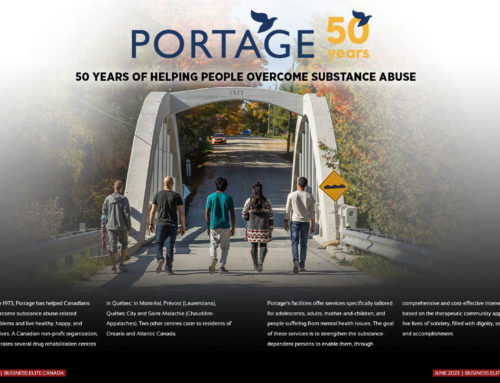Standing For Safety
By Anna Guy
With a 78-year history of advocating for safety in the industry and for its members, the Ontario General Contractors Association takes on its next big challenge: legalized marijuana.
 Health and Safety of it members, fair procurement and dispute resolution, construction excellence in Ontario’s Industrial, Commercial, and Institutional Sectors: these are some of the driving mandates of the Ontario General Contractor’s Association (OGCA).
Health and Safety of it members, fair procurement and dispute resolution, construction excellence in Ontario’s Industrial, Commercial, and Institutional Sectors: these are some of the driving mandates of the Ontario General Contractor’s Association (OGCA).
Clive Thurston is entering his 17th year as President of the largest representative of ICI General Contractors. A passionate advocate for his members, Thurston isn’t out to win a popularity contest—which, it turns out, has made him a highly respected and successful instrument of change for the industry.
Safety Risks and the Legalization of Marijuana
Of high importance to the OGCA is the impending legalization of marijuana. Thurston is adamant that without the proper tools to keep his members, the general public, and job sites safe, the legalization of marijuana will mean injuries and death on worksites.
“When I was working in construction every summer, lunch would come around, and hard-working crew members would open up their lunch and out would come a bottle of beer,” says Thurston, illuminating the point that unfettered legalization has negative consequences. Of course, today no one would consider drinking on a construction site safe—or legal—something Thurston works tirelessly to see apply to marijuana.
“I would just say we don’t seem to learn from history,” says Thurston. “[Legalization] is going to happen,” says Thurston. “So, what do we do? Unless we as employers are given the necessary tools to maintain health and safety on our site, people are going to die. That is not ‘if’, that is not a probability: that is a fact. People are going to die if the government does not give us the tools to enforce health and safety in the workplace. We have it for alcohol, we have it for certain drugs, and now we need it for marijuana.”
Indeed, the Toronto Coroners’ inquests on workplace traumatic fatalities have determined that up to 40 per cent of workplace fatalities are materially contributed to by alcohol and drugs legal or not. “The OGCA is asking the Ontario Government to take decisive action to reduce the impact on the health and safety of Ontario workers,” says Thurston.
The OGCA’s involvement has proven to be invaluable: The Ontario Government consultation, in fact, did not originally mention the impact that this will have on Health and Safety in the workplace, a “glaring omission”, and upon further investigation, the OGCA discovered those making the laws didn’t realise construction is not covered under health and safety regulations as a dangerous occupation (the way mining and diving is, for example). “We aren’t in there—it was very disappointing to find they thought we were. So now we are now working on that,” says Thurston.
“What we are asking is how do we maintain our legal obligation to maintain health and safety on our sites? If they won’t give us our tools—up to now the courts have been very reluctant to give any employer the right to test people randomly or otherwise—people are going to die.”
The OGCA has paid close attention to the TTC’s recent court victory in which the TTC obtained the right to administer random alcohol and drug testing despite strong resistance from the union representation, and once implemented, delivered immediate results.
“It’s not just about the safety of our works, but the general public as well,” explains Thurston. “The TTC now has the right to test its employees. How did they get that? They made the argument of public risk. So, I raise the question: where are all our projects? Our projects are in the middle of heavily populated areas in many cases. It’s not just our workers who are at risk from another worker who thinks I’m going out for lunch, can’t have a beer but I can have a joint.”
The OGCA has a strong track record of working in conjunction with all three levels of government, which will hopefully extend to its work with marijuana regulation. “We have far more success stories, including major collaborative success stories with the provincial government, and with the Ministry of Health.
Thurston says the OGCA is prepared to work with agencies to implement positive change in the industry.
“We are proactive, there’s no question about that,” says Thurston. I come from the industry and I’m passionate about it. I worked in it, I love it, but I know there’s good ways to do things and bad ways to do things. If you talk with us, we’ll find that good thing and everybody benefits.”






